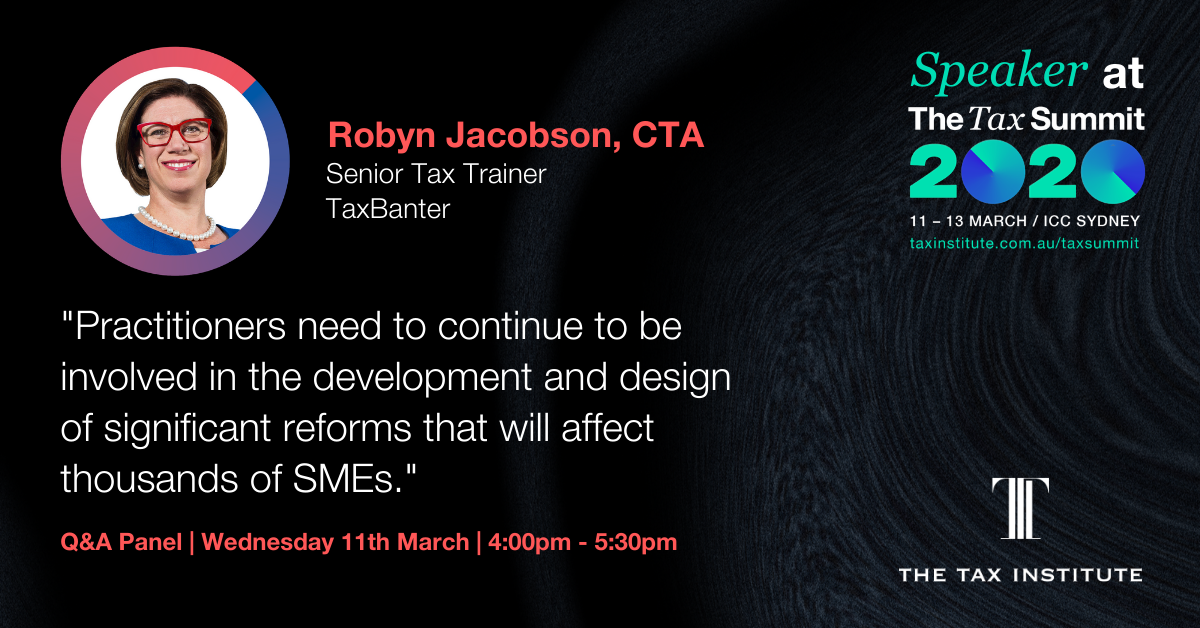
A thought leader looking to the future
Harnessing nearly 30 years of experience as an active member of the tax community, Robyn is a leading professional involved in the Victorian Professional Development Committee with The Tax Institute, the Victorian Tax Forum, Yarra Valley Tax Retreat, Noosa Tax Intensive and Private Business Tax Retreat organising committees, and is the immediate past Chair of CPA Australia’s Victorian Public Practice Committee.
Robyn is regularly involved in consultations with The Treasury and the ATO, with her focus on simplifying the complexity of tax for organisations, businesses and individuals. She has been recognised by the Women In Finance Awards 2019 as the Winner of Thought Leader of the Year. She reflects on being the Sole Director of her own training business, Cyntax Pty Ltd, before its merger with TaxBanter in 2011 as her one of her proudest career achievements to date.
She will be an integral part of The Tax Summit’s showcase interactive Q&A session, ‘Tax with 2020 Vision,’ exploring her outlook on tax reform alongside Professor Graeme Cooper of Taxation Law, University of Sydney, Ann-Maree Wolff Head of Tax at Rio Tinto and renowned current affairs journalist, Tony Jones, who will lead the discussion.
Ongoing changes and challenges set to affect SMEs in 2020
According to Robyn, businesses in Australia are ‘agents of change and innovation,’ and are necessary for creating employment and fuelling economic growth. So it’s important that governments design policies, including tax and regulatory measures, help improve the economic and technological environment of small businesses to help them thrive.
“The ATO has designed resources and tools for SMEs, including the Small business newsroom. Technological changes such as Single Touch Payroll have helped to improve the efficiency and timeliness of reporting payroll information to the ATO on salaries and wages, allowances, PAYG withholding and superannuation guarantee contributions,” Robyn says. “Although businesses need ongoing support and information to help minimise risk, one way to mitigate this risk is to ensure that a business’ financial health is well positioned to cope with unexpected events and absorb constant changes."
Proposed reforms to Div 7A
The proposed reforms to Div 7A are moving into their eighth year since the review of the provisions by the Board of Taxation was commissioned by the 'then' Labor government in 2012, and this will be one of the most significant changes to impact SMEs in 2020, Robyn says. Details of the proposed reforms are yet to be released by the government but the reforms are expected to commence on 1 July 2020, assuming the government doesn’t announce a third deferral of the measures.
Robyn emphasises the importance of practitioners to remain involved in the process and design of these reforms.
“Practitioners need to continue to be involved in the development and design of these significant reforms that will affect thousands of SMEs,” says Robyn. “Both The Tax Institute and the Board of Taxation play an important role here.”
MyGovID
MyGovID is another change set to impact SMEs for the year ahead, which requires every tax agent, BAS agent and business to adopt the new digital identifier technology when interacting online with the ATO.
Unresolved but identified issues include staff gaining access to confidential client data remotely on their digital device in a potentially inappropriate manner or environment, strict proof of identity requirements which currently exclude offshore employees and those who are not Australian permanent residents, and linking corporate trustees.
Single Touch Payroll
Meanwhile, from 1 July 2020, Single Touch Payroll will expand to include closely held payees when the current exemption for employers of these payees ends, Robyn notes.
“There are some pressing challenges for family businesses with irregular payroll cycles adopting STP for their closely held payees as they have done for their arm’s length employees,” she says. “This necessitated the ATO forming a focus group with a small group of practitioners, including myself, who have collaborated with the ATO for the past few years to design a practical and workable solution and concessional reporting options to enable employers to report payroll information relating to closely held payees through STP.”
Trust and tax law
According to Robyn, the complex interaction between trust law and tax law remains a challenge which affects nearly 900,000 trusts in Australia.
“Following the High Court’s 2010 decision in Bamford, that led to the consequential enactment of the limited trust streaming rules for capital gains and franked distributions and renewed focus on trust resolutions; there have been repeated calls from the profession to reform the taxation of trusts,” Robyn explains.
"There remains ongoing uncertainty on how the ATO would apply certain provisions such as s. 100A (of the ITAA 1936), challenges in applying the small business CGT concessions when trusts are involved, and a plethora of reporting obligations imposed on trustees of closely held trusts,” she adds.
Small business eligibility criteria
Another challenging area for SMEs is their eligibility to qualify for a range of small business tax concessions, Robyn notes.
Some conditions have become so complex that many practitioners out-source the work to experts to better manage their own and their clients’ risks. As Robyn shares, an area that is calling out for simplification is the manner in which practitioners determine whether a business is entitled to small business tax relief – in some cases, complexity, risk and compliance costs can nearly outweigh the benefit of the tax concession.
“We eagerly await the Government’s response to the final report of the Board of Taxation’s recent Review of Small Business Tax Concessions,” she adds.
Superannuation Guarantee (SG) regime
The nearly 28-year old superannuation guarantee (SG) regime imposes severe penalties on businesses which do not meet their SG obligations. Robyn reveals that due to the complexity and inequity of the SG rules, the distinction under the legislation between those who are blatantly non-compliant and those who miss their obligation by just one day is slim.
In 2018, the government announced a one-off SG Amnesty which would allow employers who had not met their obligations in the past to make good those wrongs with reduced penalties. However, political delays have seen the proposed measures remain before Parliament for nearly two years.
“The enactment of the proposed Amnesty is something the profession would like certainty on,” she says.
The FBT Act
When it comes to Fringe Benefits Tax, Robyn says some practitioners reflect on whether employment benefits should be assessed directly to the employee rather than to the employer. She suggests this would greatly increase the number of taxpayers with whom the ATO would need to engage. However, this could also be overcome by implementing a withholding regime.
“The FBT rules are out-dated given the minimal amendments over the past 34 years,” she says. “The legislation has failed to keep abreast of contemporary work practices, and compliance by all employers is dubious,” she continued.
Further, recent draft ATO guidance which expands the meaning of ‘car parking benefits’ has raised concerns across the profession that many suburban and regional employers may have an FBT liability for the first time.
Robyn’s favourite SME sessions at the Tax Summit
Robyn says she is looking forward to attending a number of keynote presentations and fantastic SME sessions at the Tax Summit including:
S4.1 as Melanie Dunn discusses the latest in SMSFs
S7 when Senior Tax Counsel Bob Deutsch shares his insights
S8 to hear the Commissioner’s perspectives on the road ahead for 2020
S9.1 as Ken Schurgott discusses trusts
S10.5 as Angela Myers discusses the impact of technology on tax practices
S14.5 as a panel comprising Adrian Cartland, Michael Cox and Steve Healey discuss disruptive innovation in technology.
Robyn is also enthused about how The Tax Summit gathers industry professionals and multi-disciplines including accounting and legal professionals, the ATO as regulator, academia and those in the digital space.
“The Tax Summit will provide invaluable opportunities for intense learning and networking,” says Robyn. “It is pleasing to see a stream dedicated to technology and emerging leaders, complementing the conventional SME and corporate streams.”
Get ready to see Tax with 2020 Vision
Don’t miss your chance to see The Tax Summit’s showcase interactive Q&A session, ‘Tax with 2020 Vision,’ exploring Robyn’s outlook on tax reform alongside Professor Graeme Cooper of Taxation Law, University of Sydney, Ann-Maree Wolff Head of Tax at Rio Tinto and renowned current affairs journalist, Tony Jones, who will lead the discussion.
Attend The Tax Summit and discover over 60 sessions delivered by local and global tax experts, across SME, Corporate and Hot Topic streams.
The Tax Summit also includes keynote sessions from the biggest and brightest minds in tax, 90+ speakers, interactive workshops and four new streams: Professional Practice, Emerging Leaders, International and Technology.
With over 1,000 attendees against the stunning harbourside backdrop of the ICC in Sydney, The Tax Summit is the unmissable opportunity to network, refine your skills and take your career to the next level.
Don’t get left behind. Register for The Tax Summit 2020 today.









